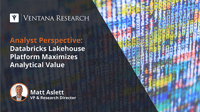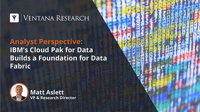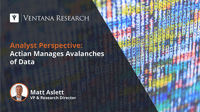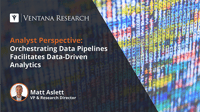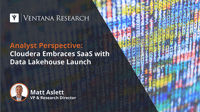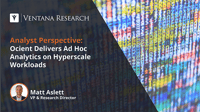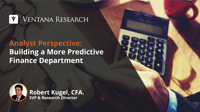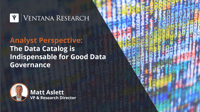I have previously written about growing interest in the data lakehouse as one of the design patterns for delivering hydroanalytics analysis of data in a data lake. Many organizations have invested in data lakes as a relatively inexpensive way of storing large volumes of data from multiple enterprise applications and workloads, especially semi- and unstructured data that is unsuitable for storing and processing in a data warehouse. However, early data lake projects lacked structured data...
Read More
Topics:
Business Intelligence,
Data Governance,
Data Management,
Data,
AI & Machine Learning,
Streaming Data & Events,
Analytic Data Platforms
I have written recently about the similarities and differences between data mesh and data fabric. The two are potentially complementary. Data mesh is an organizational and cultural approach to data ownership, access and governance. Data fabric is a technical approach to automating data management and data governance in a distributed architecture. There are various definitions of data fabric, but key elements include a data catalog for metadata-driven data governance and self-service, agile data...
Read More
Topics:
Business Intelligence,
Cloud Computing,
Data Governance,
Data Management,
Data,
data operations,
AI & Machine Learning,
operational data platforms
In their pursuit to be data-driven, organizations are collecting and managing more data than ever before as they attempt to gain competitive advantage and respond faster to worker and customer demands for more innovative, data-rich applications and personalized experiences. As data is increasingly spread across multiple data centers, clouds and regions, organizations need to manage data on multiple systems in different locations and bring it together for analysis. As the data volumes increase...
Read More
Topics:
Data Management,
Data,
data operations,
Analytic Data Platforms
I have written a few times in recent months about vendors offering functionality that addresses data orchestration. This is a concept that has been growing in popularity in the past five years amid the rise of Data Operations (DataOps), which describes more agile approaches to data integration and data management. In a nutshell, data orchestration is the process of combining data from multiple operational data sources and preparing and transforming it for analysis. To those unfamiliar with the...
Read More
Topics:
Data Management,
Data,
data operations,
AI & Machine Learning,
Analytics & Data
Ventana Research’s Data Lakes Dynamics Insights research illustrates that while data lakes are fulfilling their promise of enabling organizations to economically store and process large volumes of raw data, data lake environments continue to evolve. Data lakes were initially based primarily on Apache Hadoop deployed on-premises but are now increasingly based on cloud object storage. Adopters are also shifting from data lakes based on homegrown scripts and code to open standards and open...
Read More
Topics:
Business Intelligence,
Data Governance,
Data Management,
Data,
data operations,
AI & Machine Learning,
Analytics & Data,
Streaming Data & Events,
operational data platforms,
Analytic Data Platforms
I have written before about the continued use of specialist operational and analytic data platforms. Most database products can be used for operational or analytic workloads, and the number of use cases for hybrid data processing is growing. However, a general-purpose database is unlikely to meet the most demanding operational or analytic data platform requirements. Factors including performance, reliability, security and scalability necessitate the use of specialist data platforms. I assert...
Read More
Topics:
business intelligence,
Cloud Computing,
Data Management,
Data,
Analytics & Data,
Analytic Data Platforms
A predictive finance department is one that can command technology to be more forward-looking and action-oriented while still fulfilling its core role of handling the financial elements of its organization including accounting, treasury and corporate finance. Beyond just automating rote tasks, technology also facilitates a shift toward becoming a predictive finance organization. Greater amounts of information, now available in near real time, and the increasing use of artificial intelligence...
Read More
Topics:
Office of Finance,
Business Intelligence,
Data Management,
Business Planning,
Financial Performance Management,
ERP and Continuous Accounting,
digital finance,
AI & Machine Learning
I have recently written about the organizational and cultural aspects of being data-driven, and the potential advantages data-driven organizations stand to gain by responding faster to worker and customer demands for more innovative, data-rich applications and personalized experiences. I have also explained that data-driven processes require more agile, continuous data processing, with an increased focus on extract, load and transform processes — as well as change data capture and automation...
Read More
Topics:
Cloud Computing,
Data Management,
Data,
data operations,
Analytics & Data
Organizations are collecting data from multiple data sources and a variety of systems to enrich their analytics and business intelligence (BI). But collecting data is only half of the equation. As the data grows, it becomes challenging to find the right data at the right time. Many organizations can’t take full advantage of their data lakes because they don’t know what data actually exists. Also, there are more regulations and compliance requirements than ever before. It is critical for...
Read More
Topics:
Business Intelligence,
Data Governance,
Data Management,
data operations,
AI & Machine Learning
The data catalog has become an integral component of organizational data strategies over the past decade, serving as a conduit for good data governance and facilitating self-service analytics initiatives. The data catalog has become so important, in fact, that it is easy to forget that just 10 years ago it did not exist in terms of a standalone product category. Metadata-based data management functionality has had a role to play within products for data governance and business intelligence for...
Read More
Topics:
business intelligence,
Data Governance,
Data Management,
Data,
data operations,
Analytics & Data
